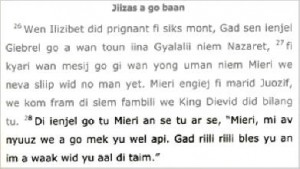SHOULD THE BIBLE BE WRITTEN IN PATOIS? –
Jamaica’s patois Bible: The Word of God is now available in creole
By Michael Ireland
Senior International Correspondent, ASSIST News Service
KINGSTON, JAMAICA (ANS) — For the first time the Bible is being translated into Jamaican patois.
According to the British Broadcasting Corporation (BBC), it’s a move welcomed by those Jamaicans who want their mother tongue enshrined as the national language — but opposed by others, who think learning and speaking English should be the priority.
In its report, by Robert Pigott, BBC News religious affairs correspondent,the BBC said that in the Spanish Town Tabernacle near the capital, Kingston, the congregation is hearing the word of God in the language of the street for the first time.
At the front of the concrete-block church, a young man and woman read alternate lines from the Bible. This is the Gospel of St Luke in Jamaican patois — or more precisely, “Jiizas – di buk we Luuk rait bout im.”
The sound of the creole, developed from English by West African slaves in Jamaica’s sugar plantations 400 years ago, has an electrifying effect on those listening, the BBC said.
Several women rose to testify, in patois, to what it means to hear the Bible in their mother tongue.
“It’s almost as if you are seeing it,” says a woman, referring to the moment when Jesus is tempted by the Devil. “In the blink of an eye, you get the whole notion. It’s as though you are watching a movie… it brings excitement to the word of God.”
The Rev Courtney Stewart, General Secretary of the West Indies Bible Society, who has managed the translation project, insists the new Bible demonstrates the power of patois, and cited a line from Luke as an example.
Excerpt from the Bible: ‘Jesus will be born…’ Luke, chapter one, verses 26-28
(Graphic via BBC website).
It’s the moment when the Angel Gabriel goes to Mary to tell her she is going to give birth to Jesus.
English versions read along these lines: “And having come in, the angel said to her, ‘Rejoice, highly favored one, the Lord is with you: blessed are you among women.'”
“Now compare that with our translation of the Bible,” says Stewart.
“De angel go to Mary and say to ‘er, me have news we going to make you well ‘appy. God really, really, bless you and him a walk with you all de time.”
Stewart told the BBC the project is largely designed to bring scripture alive, but it also has another important function — to rescue patois from its second-class status in Jamaica and to enshrine it as a national language.
“The language is what defines us as Jamaicans,” insists Courtney Stewart. It is who we are — patois-speakers.”
The BBC said the patois Bible represents a bold new attempt to standardize -the language, with the historically-oral tongue written down in a new phonetic form.
For example the passage relating the angel’s visit to Mary reads: “Di ienjel go tu Mieri an se tu ar se, ‘Mieri, mi av nyuuz we a go mek yu wel api. Gad riili riili bles yu an im a waak wid yu all di taim.”
In its online report, the BBC said the New Testament has been completed by a team of translators at the Bible Society in Kingston — working from the original Greek — who intend to publish it in time for the 50th anniversary of Jamaica’s independence from Britain on August 6 next year.
But some traditionalist Christians say the patois Bible dilutes the word of God, and insist that creole is no substitute for English, the BBC reports.
Bishop Alvin Bailey, at the Portmore Holiness Church of God near Kingston, argued that Patois is too limited a language to represent the nuances of Biblical text, and has to resort to coarse expressions to makes its meaning clear.
“I don’t think the Patois words can effectively communicate what the English words have communicated,” he said, adding: “Even those (Patois) words that we would want to use to fully explain what was in the original, are words that are vulgar.”
Many others see the elevation of patois as a backward step for Jamaica, in a globalised world demanding English.
The BBC explained that the vast majority of children arrive at school speaking little apart from the creole of their ancestors, and teachers are under intense pressure from the government to replace it with English.
The head teacher at St Richard’s Primary School in Kingston, Jacqueline Williams, said she can understand the policy, because people make up so much of what Jamaica exports.
“If they do go elsewhere they would have to have English as the language of communication,” she says. “That’s why it is being sold as our first language.”
The BBC said that pressure is felt by even by the smallest of the children in their smart uniforms playing outside the two blocks of brightly-colored classrooms.
“A little child in our class who can only speak that way… is going to be embarrassed,” said Williams. “I think that esteem problems can develop because of it.”
The BBC report went on to say that linguists at the University of the West Indies in Kingston, who have been working on the translation, insist that patois is an authentic language, with its own tenses and consistent grammatical rules.
Dr Nicole Scott claims that the response to declining exam results in English — which has been to reinforce the emphasis on English — is counter-productive.
“Literacy in patois would help the students to appreciate the structures that are used in English,” she said.
Dr Scott said the new system of writing used the in patois Bible is critical if language skills are to be taught in creole, and that the Bible holds sufficient sway in Jamaica to act as powerful model, the BBC reported.
“I think it will be massively, massively, helpful. People will realize they can hear the word of God in their own language and understand it very well, this same language that has been stigmatized for so long,” Scott said.
Sugar plantation Patois was developed from English by African slaves on sugar plantations, the BBC stated.
Faith Linton, a linguist of almost 80 years of age, who was one of the founders of the Patois Bible project, believes the way patois continues to be looked down upon threatens the very future of Jamaica itself.
From the balcony of her old plantation estate house on the north coast of Jamaica, managers once kept an eye on slaves working the sugar cane.
She spoke nothing but patois until she was 12.
“The damage is deeply psychological,” she insisted. “The patois-speaker feels inferior, full stop.”Because the model is the white English man, his language and educational standards… and we have not been able to attain it.
“Out of this sense of inferiority will come violence, illiteracy, disturbed behavior and damaged emotional attitudes. All those spring from the idea that my identity is inferior,” she said.
A few Jamaican patois rules:
Plural nouns are made with the word “dem” (“they” or “them” in English) — so the plural of “uoli prafit” (“holy prophet”![]() is “uoli prafit dem”, and the plural of “enimi” (“enemy”
is “uoli prafit dem”, and the plural of “enimi” (“enemy”![]() is “enimi dem”
is “enimi dem”
The past tense is marked by the word “did” — so “he lived” is, in patois, “im did liv”
The future tense can be marked with ” a go” or “wi” (“will”![]() — “Im a go siev” is “He will save”, and “Yu wi nuo” is “You will know”
— “Im a go siev” is “He will save”, and “Yu wi nuo” is “You will know”

Examples:
“Jos laik ou im did taak chuu im uoli prafit dem” — Just like how he talked through his holy prophets
“Im a go siev wi fram wi enimi dem” — He will save us from our enemies
“So yu wi nuo se wa yu ier a chuu” — So you will know that what you hear is true
http://www.assistnews.net/Stories/2011/s11120112.htm
****RULES**** 1. Debates and rebuttals are allowed but disrespectful curse-outs will prompt immediate BAN 2. Children are never to be discussed in a negative way 3. Personal information eg. workplace, status, home address are never to be posted in comments. 4. All are welcome but please exercise discretion when posting your comments , do not say anything about someone you wouldnt like to be said about you. 5. Do not deliberately LIE on someone here or send in any information based on your own personal vendetta. 6. If your picture was taken from a prio site eg. fimiyaad etc and posted on JMG, you cannot request its removal. 7. If you dont like this forum, please do not whine and wear us out, do yourself the favor of closing the screen- Thanks! . To send in a story send your email to :- [email protected]






Recent Comments